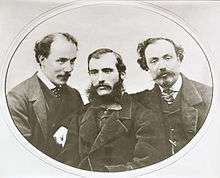Fratelli Alinari
Fratelli Alinari is the world's oldest photographic firm, founded in Florence, Italy in 1852. Its archives contains 5.5 million photographs, ranging from daguerreotypes to modern digital photos from around the world.

Founding
In 1852, Leopoldo Alinari founded a photographic studio. His brothers Giuseppe and Romualdo joined him two years later to establish Fratelli Alinari Fotografi Editori, a photographic workshop dedicated initially to the documentation of notable Italian paintings, sculptures, and architecture.[1] They subsequently expanded the scope of their photographic project to include the towns and landscapes of Italy,[1] as well as portrait photography and images of national costume. The brothers achieved recognition for the quality of their work, and by 1860 their portrait subjects included the Italian royal family.[2]
Today
It is the oldest foundation in the world still active in the field of photography, and more generally in the sphere of the image and communication. Today Alinari is the guardian of a photographic corpus which includes a patrimony of its own of over 5,500,000 pictures, historical and contemporary, ranging from vintage prints, glass plate negatives to film and fotocolors, and is responsible for the management of an ongoing program of exhibitions and publishing. It can supply iconographical research services and manages both Italian and foreign photographic archives, constantly increasing its "image-bank", in part already on microfiches and now also on digital supports which will be available for consultation on-line. Alinari also provides photographic publishing and its Art Printworks still uses the artisan technique of collotype on paper and silver plates from photographic images.
From 2007, the Museum of Multimedia and History of Photography (MNAF) is open to the public in Florence, Italy,[3] providing a special service on photographic exhibitions, permanent show of material about the history of photography, and education/training services for students and people with disabilities (there is a section with 3D images where blind people can touch 3D artifacts and understand the images in a unique way).
Alinari on-line and the restoration laboratory
In order to make the images available to a greater number of persons, Alinari has established an on-line search system of its photographic archives, employing a system of iconographic classification produced in collaboration with the University of Florence with over 330,000 images. 400 new images are added online daily. The digitization process is done using a Kodak EverSmart Supreme flatbed scanner and a Leaf/Mamiya 80 megapixels Aptus II 12 80 digital camera back. Color correction is done using Eizo monitors through a fully calibrated system. Color profiling is done using Adobe '98 color space.
European projects
In 1994 the firm began numerous initiatives for collaboration in technological and cultural projects in Europe. Among the most important are Aquarelle, Artline, Victor, Imprimatur, aceMedia, Euridice, 2Kan, Orpheus, Ermione, RegNet, TNT, Migrator 2000, eCHASE, aceMedia, Multimatch and today: MILE, Tripod, Eurogene, Fotomemoria, CITER and today GLOCAL, VisitoTuscany, CONVERGENCE, Paths, Decipher, Glocal and today BBinding, EuropeanaPhotography and Ambrosia. The Archive is active in Italy and Europe in several research and education research and marketing validation project, providing contribution mainly in the following domains: watermarking, digital rights management, content provider, 2D-3D applications, image enhancement, intelligent content retrieval, web semantic and ontologies, distance learning, preservation and image restoration, validation, testing, mobile .app, exploitation, multimedia content supply.[4]
References and notes
- Fratelli Alinari - The J. Paul Getty Museum
- Hannavy, John (2013). Encyclopedia of Nineteenth-Century Photography. Routledge. p. 25. ISBN 1135873267.
- Museo Nazionale Alinari della Fotografia
- Photolibrary Educational
External links
![]()